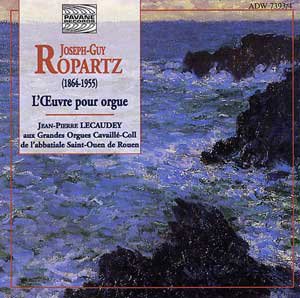|
|
Search MusicWeb Here |
|
 |
||
|
Founder:
Len Mullenger (1942-2025) Editor
in Chief:John Quinn
|
|
|
Search MusicWeb Here |
|
 |
||
|
Founder:
Len Mullenger (1942-2025) Editor
in Chief:John Quinn
|
 |
Joseph-Guy ROPARTZ
(1864-1924) The complete organ works Offertoire Pascal (1894) Trois Pièces (1894) Six Pièces (1896/1901) Versets du commun des Saints (1898) Deux Petites Pièces (1899) Trois méditations (1917) Rhapsodie sur deux Noëls populaire de la Haute-Bretagne (1917) Introduction et Allegro moderato (1917) Grandes Orgues Aristide Cavaille-Coll de l'abbatiale de Saint--Ouen de Rouen (France) rec 8-9 April 1997, Rouen |
| CD available for post-free online mail-order or you may download individual tracks. For some labels you can download the entire CD with a single click and make HUGE savings. The price you see is the price you pay! The full booklet notes are available on-line. | |
|
NOTE • Click on the button and you can buy the disc or read the booklet details • You can also access each track which you may then sample or down load. • Further Information. |
|
|
Ropartz's organ works are a product of the first part of his life from thirty up to the age of fifty-three. Most date from the 1890s with three works from the penultimate year of the Great War.
The Offertoire is a rather Delian fantasy-meditation rising to a most unDelian scrunching climax and falling back into reflection. The Trois Pièces date from the same year which saw Ropartz taking up the directorship of the Conservatoire at Nancy. Aside from some strangely Finzian melisma these works have a similar character to the Offertoire. From two years later come the Six Pièces with a specially strong Prélude Funèbre. The Sortie from this set is sprightly, sanguine, care-free and regal - breaking the otherwise suffocatingly introspective mood. The whopping (13.23) Fantaisie is a grandiloquent harmony-crunching flourish which is strongly suggestive of orchestral treatment. It is suffused with a spectral Franckian character - gothic, romantic and flamboyant.
The second (shorter) disc has nine pieces from the 1890s. The seven Versets are meek and subdued as is meet to their liturgical purpose; similarly the Deux Pièces.
1917 seems to have seen a burst of creative activity for Ropartz. The three Méditations are hesitant and cloud-hung. Outstanding is the tremulously spectral second Méditation which slews into tragedy for reasons which are presumably tied up with the slaughter of the times. It is interesting to compare this music with the war works of Elgar. No doubt there was much call for this music - a channel for sorrow.
By contrast the Rhapsodie is damsel-winsome, smiling and honeyed with little echo and carillon effects. This is a winner of a piece which should be played in mixed recitals. It would go well at any time of year but Christmas would be its natural home.
The disc ends with the Introduction and Allegro Moderato which combines romping Bachian splendour with Gothic character. This is Ropartz keyed into the grand stream of French organ works. It is an exercise in optimism and in honouring the great tradition.
Congratulations to Pavane on the choice of a single width fold-out case. Fine documentation from M. Lecaudey. An 1886 Monet adorns the cover: Les rochers de Bell-Île (La côte sauvage); very suitable given Ropartz deeply-struck Breton roots. I seem to recall that this same Monet was used by another French company for the cover of a CD of Ropartz songs. Lecaudey explains his choice of registrations in the notes and the full pipe-specification of the Cavaillé-Coll instrument is given.
Standout tracks are CD1: tracks 1, 10; CD2: tracks 13, 14.
Well done on every count. A strong commendation to students of: Ropartz (a growing band, I hope), of the French organ and (in the case of five of the 24 tracks) of music written during the Great War.
Rob Barnett
|
|
ADDITIONAL INFORMATION •
You can sample only 30 seconds (or 15% if that is longer) of a given track. Select from the View tracks list. Each sample will normally start from the beginning but you can drag the slider to any position before pressing play. • PLEASE NOTE: If you are behind a firewall and the sound is prematurely terminated you may need to register Ludwig as a trusted source with your firewall software.
•You will need Quicktime to hear sound samples. Get a free Quicktime download here • If you cannot see the "Sample All Tracks" button you need to download Flash from here.
|
|
|
Return to Index |